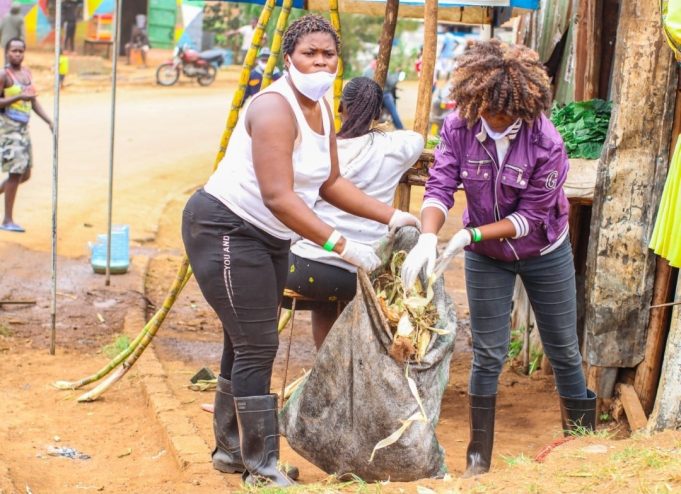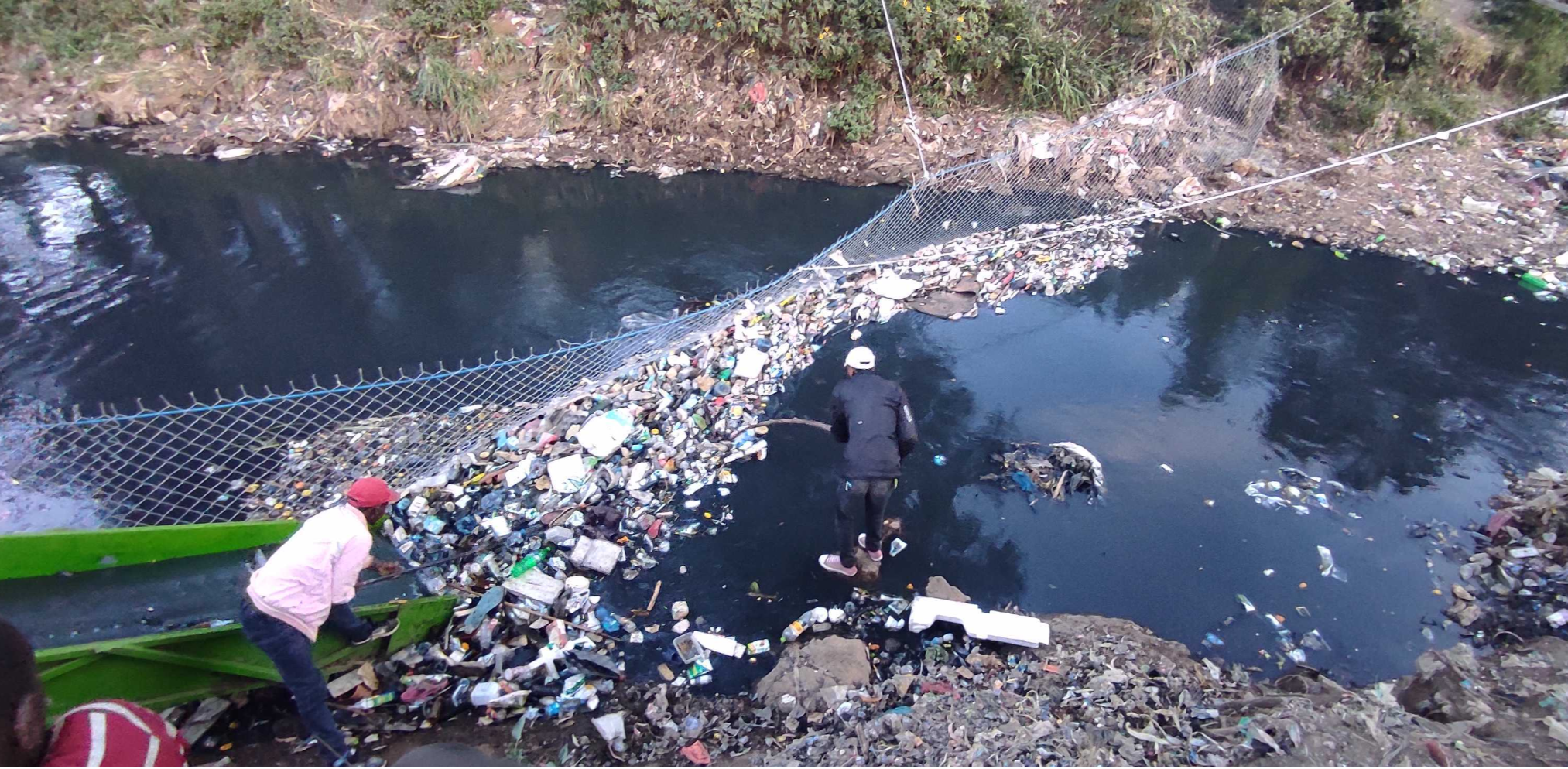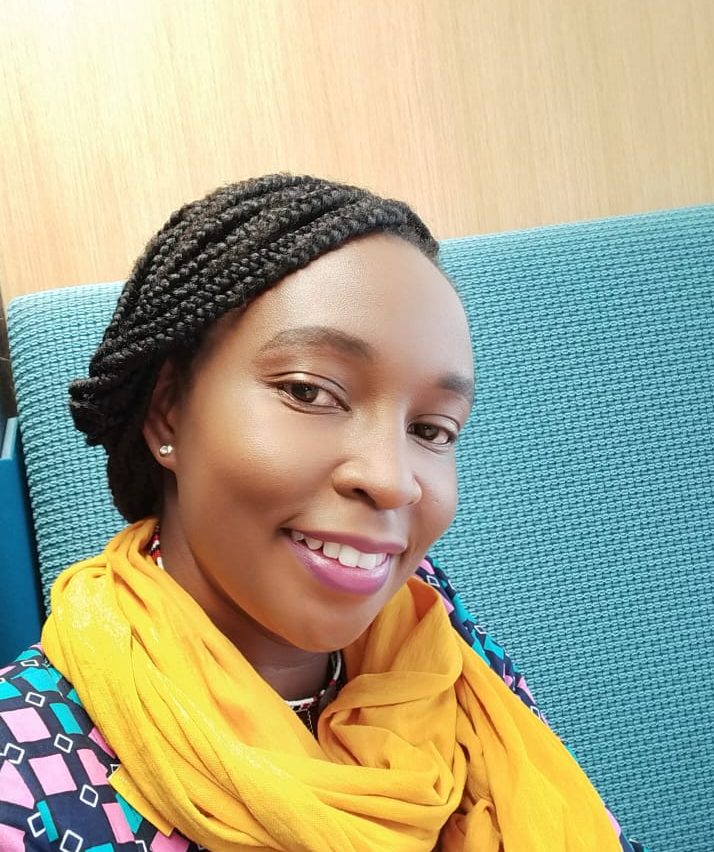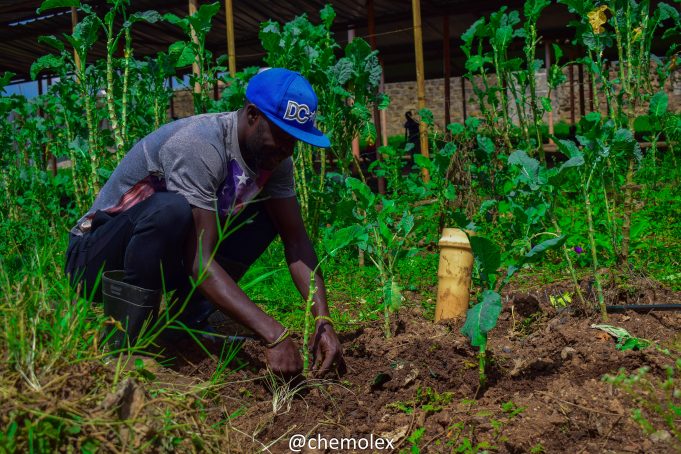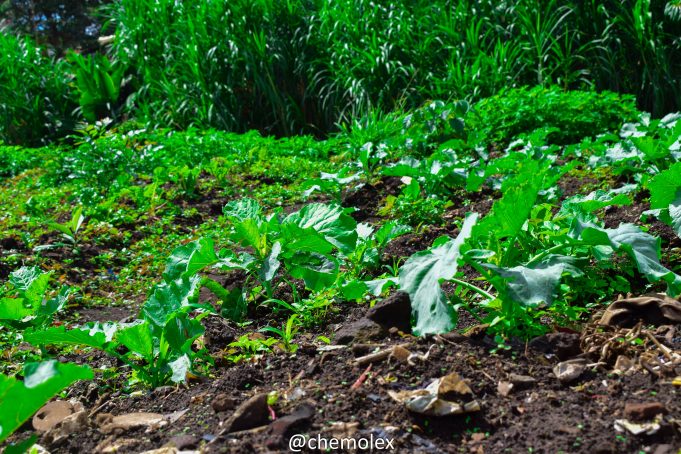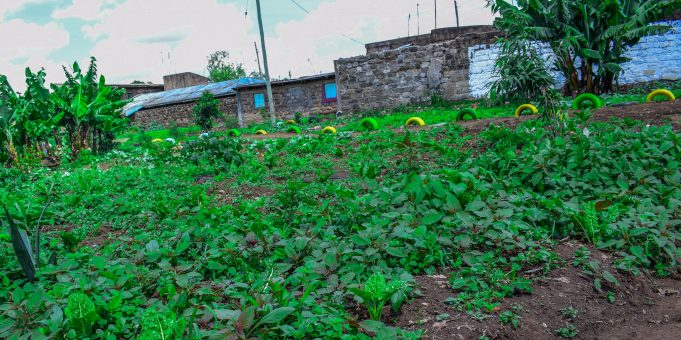Nairobi produces 3000 tons of waste daily; barely half of this waste gets to the landfills which means the rest remains uncollected ending up in waterways especially during the rainy season. Only 8-10% of the waste collected is recycled. The need to inculcate the culture of Reducing, Reusing, and Recycling are critical because the path we have taken is not sustainable and we have already started paying the price. Plastics bags and fabrics pile up getting buried in the sediments and build up season after season, causing the river to rise quickly when it rains. Water floods along the riparian and surrounding lands cause a lot of damage to property and sometimes even life.
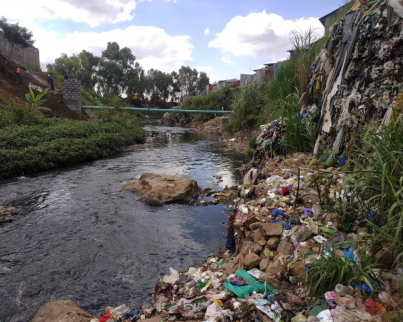
Trash accumulating along the riverbank 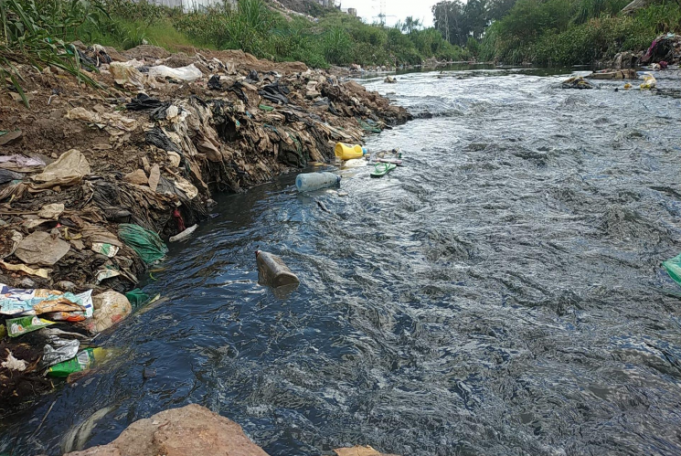
Trash suffocating the soil along the riverbank
Our journey as Chemolex towards Cleaner Rivers, which ensures cleaner oceans, has been eye-opening. It is encouraging to see partnerships that ensure our work bears fruit. This partnership has been achieved through state collaboration where environmental government institutions have embraced our cause and occasionally give guidance, especially where there’s a need to enforce existing laws. Partnerships with private entities such as hotels, clubs, and restaurants help us arrest the plastic waste challenge at the source. Community partnerships and ownership, which is the most critical element, ensures that our plastic capture devices are not vandalized and they voluntarily participate in our cleaning efforts. That support gives us the opportunity to raise awareness further into the communities living alongside the riparian lands as we work together to provide solutions towards the challenge of waste disposal in the rivers.
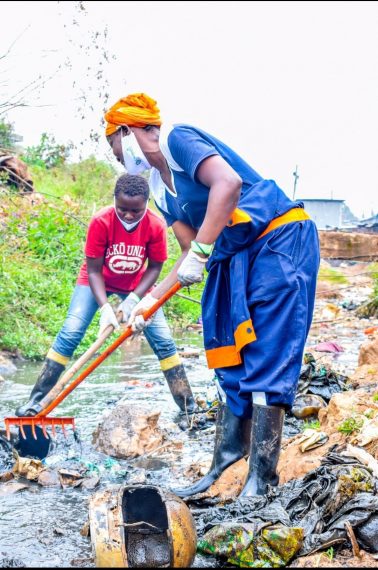
Volunteers removing trash from the river 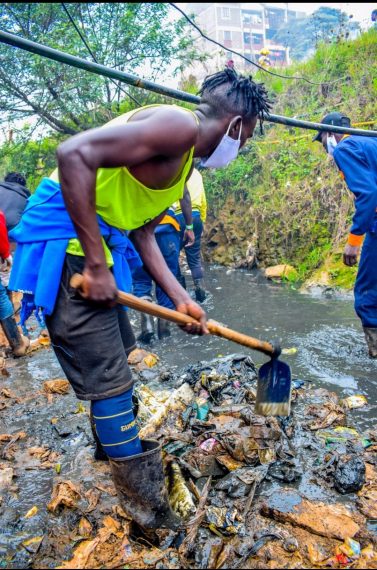
Teams of volunteers collecting trash along the riverbank
This is our second year into the project and so far we have collected over 130 tons of plastic waste, with 6 plastic capture devices. This however has not come without its fair share of challenges. We want to share some of the most notable challenges and strategies to address them with our readers in case the lessons we have learned help other practitioners succeed:
Land
Land in Kenya, as would be in most parts of the world, is a very sensitive issue. Even though the riparian land should not be occupied according to the Kenyan environmental laws, some people have taken up these spaces as plots and claim ownership which initially frustrated efforts to set up the plastic capture devices. These false owners would demand rent payment in order to allow the devices to be set up. Our efforts to rehabilitate these spaces by planting trees and other greening efforts are often met with ‘…this is someone’s land’ and you need permission to do so, even when it’s clear where the borders are. There have been cases of destruction of property when aggrieved people incite the community to reject the project. This is an area we navigate with great caution for the sake of this project. While we have the option of taking legal action now that we work closely with government environmental agencies like NEMA (National Environment Management Authority), WARMA (Water Resources Management Authority), and NMS (Nairobi Metropolitan Services). We choose to embrace dialogue in order to maintain goodwill with the people living in this area.
Weather
In Kenya, we experience two rainy seasons, and since the project started, we have gone through 3 seasons. Our plastic capture devices are fitted with mortars that constantly get damaged when rivers flood. Sometimes the devices are completely swept away by the floodwaters. In order to mitigate the impacts of the floods on the motor, Chemolex Company has developed a strong metal casing for the device that ensures that the motor is protected from heavy rain as well as sunshine. The strong metal casing also protects the motors and other movable parts of the plastic capture device from vandalism or theft.
Continuity
We have cleaned up most of the areas we have set up our plastic capture devices and are in the process of greening and continuously improving them. The challenge comes in when people would come in at night to dump waste in the already cleaned up areas forcing the teams to constantly clean up the same areas over and over again denying us a chance to move focus on other areas. In a bid to address this challenge, we are currently creating vegetable gardens in a bid to discourage dumping. The vegetable gardens are currently benefiting young women and youth groups as their daily meal. Also, these women do sell extra vegetables to earn weekly income for use in their households.
Covid-19 pandemic
Last year, despite the pandemic, local guidelines were flexible and this allowed us to do community clean-ups frequently. This year, we have not been able to do the same because of the amended guidelines and this means the ground is getting ‘cold.’ We were quickly picking up pace towards behavioral change so when we are out of sight, we are out of mind. Currently, we have partnered with women and youth groups that are strategically well-positioned to educate and create awareness to the riparian households at individual levels with strict conformity to the COVID 19 protocols by the Ministry of Health. The women and youth groups have helped to establish significant momentum on proper wastes management at the household levels.
Unexpected costs
This comes about when the needs on the ground are more than they were envisaged and hence budgeted for. For example, we find ourselves constantly improving the designs and repairing the plastic capture devices, which is something we had not anticipated.
Politics
Politics at the ground level means there are always people with vested interests who may sometimes see our efforts as an affront to their office, or paint them in a bad light. As a result, they may turn down any help we may require from them or turn a blind eye to our requests. Our key strategy in navigating the challenging political environment is working closely with key regulators such as the National Environmental Authority (NEMA) and County Government to ensure full protection during the project implementation. The key environmental regulators have helped us to educate the community and achieve project credibility as well as authenticity within the riparian households.
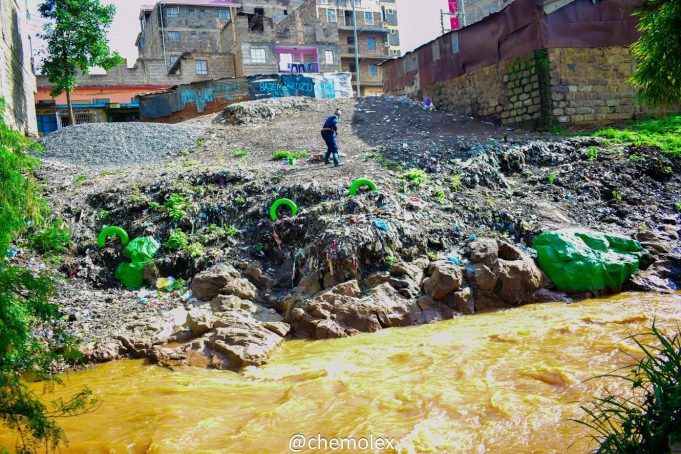
View of the polluted waters and plastics along the riverbank 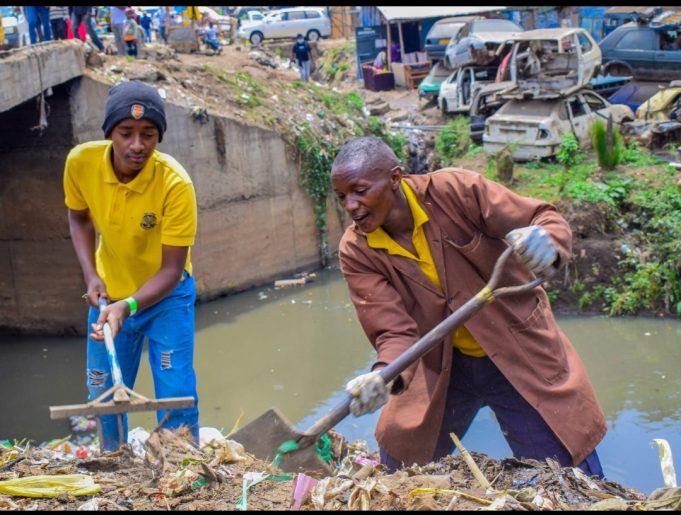
Two community members removing trash
In conclusion, this project, therefore, offers an effective solution to arrest plastic and other waste from River Athi which is a major pathway for the transport of plastic wastes into the Indian Ocean. Despite the challenges experienced in the first year, we have continually reinvented ourselves with solutions that are unique to each site that we installed a device. This has helped us to make significant strides in creating a positive behavior change on the management of wastes within the riparian households along River Athi. As a result, and over the past year, we have also arrested more than 130 metric tons of plastics from the six project sites along the river. Hence, we are optimistic that by the end of 2023, our efforts will help to increase plastic recycling to up to 95% within major cities where River Athi flows.
